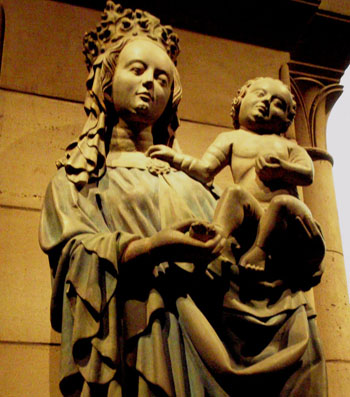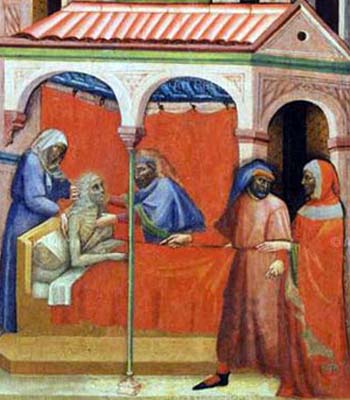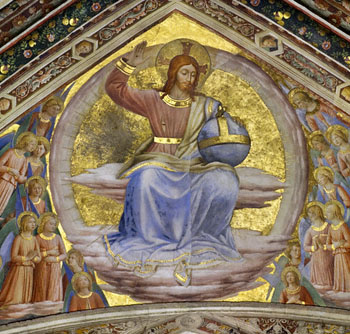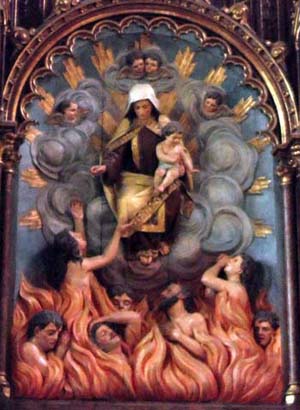Faith under Attack
 |
 |
 |
 |
 |
 |
 |
On Purgatory - Part V
Means to Avoid Purgatory
This final article of the series on Purgatory will deal with the means to avoid it. In his book Purgatory Illustrated, Fr. Schouppe details six means, to which I have added another, as well as included several important points for my readers.
Devotion to Mary
First, in order to obtain great purity of soul, we must cherish a great devotion to the Blessed Virgin Mary. The deeper and truer our devotion to her, the less reason we will have to fear Purgatory, for she will assist her children in cleansing their souls and thus shorten their stay in Purgatory.
 To dispel excessive fear, she told her servant Fr. Jerome Carvalho, a Jesuit who died in the odor of sanctity in 1604, these consoling words: "Have confidence, my son. I am the Mother of Mercy for my dear children in Purgatory as well as for those still living upon earth." (1)
To dispel excessive fear, she told her servant Fr. Jerome Carvalho, a Jesuit who died in the odor of sanctity in 1604, these consoling words: "Have confidence, my son. I am the Mother of Mercy for my dear children in Purgatory as well as for those still living upon earth." (1)
In the Revelations of St. Bridget, we read similar words of Our Lady: "I am the Mother of all those who are in the place of expiation. My prayers mitigate the chastisements inflicted upon them for their faults." (2)
Those who wear the brown scapular of Our Lady of Mount Carmel have a special right to the protection of the Blessed Mother. On July 16, 1251, Our Lady appeared to St. Simon Stock and said: "Receive, my dear son, this scapular of thy Order. It is the badge of my Confraternity and the pledge of a privilege that I have obtained for thee and for the brethren of Mount Carmel. Those who die devoutly clothed in this habit shall be preserved from eternal fire. It is the sign of salvation, a safeguard in peril, a pledge of peace and special protection, until the end of time." (3)
It should be noted that the words "devoutly clothed" are significant. It is often thought that salvation is attained when wearing the brown scapular even if the person is in mortal sin. This is a presumptuous position, for there are special conditions required for the privilege. (see here).
But the Blessed Mother has promised mercifully that one who wears the brown scapular will receive an efficacious grace worthy to confess his sins or be granted the time to make an act of perfect contrition. There are many miraculous proofs of the fulfillment of this promise.
The great importance of the Sabbatine privilege given 50 years after the death of St. Simon Stock and authorized by Pope John XXII was discussed in another article (here). This is the promise of Our Lady to release from Purgatory souls dedicated to her on the first Saturday after their deaths.
Charity and works of mercy
 A second means to avoid Purgatory is to practice charity and works of mercy. For charity covers a multitude of sins (1 Pet 4:8) and will cause us to find mercy on the day of Justice. In the Life of St. Margaret Mary, Msgr. Languet relates that the Saint, who was then Mistress of Novices, was praying for the father of one of her novices who had recently died.
A second means to avoid Purgatory is to practice charity and works of mercy. For charity covers a multitude of sins (1 Pet 4:8) and will cause us to find mercy on the day of Justice. In the Life of St. Margaret Mary, Msgr. Languet relates that the Saint, who was then Mistress of Novices, was praying for the father of one of her novices who had recently died.
When the novice came again to request more prayers, St. Margaret Mary told her to be tranquil, because the generous act of charity her father had performed before dying had won him a good judgment.
The novice asked her Mistress what that act was, and learned that when the Holy Viaticum was brought to him, the town butcher had joined the procession accompanying the Blessed Sacrament. Before all present, her father had asked that man to approach, pressed his hand warmly and asked pardon for some hard words he had addressed to him from time to time, wanting all present to be witness of the reparation that he made. (4)
God punishes those who have failed in charity severely, but habitually He is very merciful toward those who have practiced this virtue so close to His Heart.
The practice of mortification
The third means of satisfying in this world for one's sins is the practice of mortification and religious obedience. The first and best mortification is that which comes with the fulfillment of our daily duties and bearing the trials we encounter in this life in union with Christ. He who satisfies the duties and sufferings of each day, Fr. Schouppe notes, will soon advance and impose voluntary sufferings upon himself to avoid the pains of Purgatory. (5)
The Sacraments
The fourth means for expiation of temporal punishment on earth is the constant use of the Sacraments, and especially the holy reception of Extreme Unction on the approach of death. Our Lord admonishes us in the Gospel to prepare ourselves well for death.
His desire is that we depart the world purified as a means to avoid Divine Justice. The pains of sickness that occur before death should be offered for this end, when the person is spiritually well. For this reason also we should piously receive the Extreme Unction at the danger of death, having made a good Confession and Communion before, if the circumstances permit.
 For any sick person, even without a near danger of death, the effects of the Sacraments help his spiritual needs. Fr. Schouppe tells us: "These divine remedies purify the soul from its sins, and increase its treasure of sanctifying grace. They fortify the sick person, and enable him to bear his sufferings with patience, to triumph over the assaults of the Devil at the last moment, and to make a generous sacrifice of his life to God.
For any sick person, even without a near danger of death, the effects of the Sacraments help his spiritual needs. Fr. Schouppe tells us: "These divine remedies purify the soul from its sins, and increase its treasure of sanctifying grace. They fortify the sick person, and enable him to bear his sufferings with patience, to triumph over the assaults of the Devil at the last moment, and to make a generous sacrifice of his life to God.
"Moreover, besides the effects they produce upon the soul, the Sacraments exert a salutary influence upon the body. Extreme Unction especially comforts the sick person and alleviates his sufferings. It even restores him to health, if God judges it expedient for his salvation."(6)
The Sacraments are of inestimable benefit. Thus Satan attempts to deprive the faithful of them by making us neglect receiving them or indefinitely postponing receiving them. Many souls fall into this snare.
The most precious effect of Extreme Unction is that which it produces on the soul by purifying it from the remains of sin and taking away, or diminishing, the debt of temporal expiation in Purgatory.
Carefully weigh God's mercy and justice
 The fifth means to obtain favor before the tribunal of God is to have great confidence in His mercy even while keeping in mind that His mercy and justice are equal. "In Thee, O Lord, I have hoped. Let me not be confounded in eternity," says the Prophet (Ps 20).
The fifth means to obtain favor before the tribunal of God is to have great confidence in His mercy even while keeping in mind that His mercy and justice are equal. "In Thee, O Lord, I have hoped. Let me not be confounded in eternity," says the Prophet (Ps 20).
St. Francis de Sales used to say that if he considered only his misery, he deserved Hell. But full of humble confidence in the mercy of God and the merits of Jesus Christ, he firmly hoped to share the happiness of the elect.
"We must," he said, "die between two pillows: the one, of the humble confession that we merit nothing but Hell. The other, of an entire confidence that God, in His mercy, will give us Paradise. Hope in God! He who hopes in Him shall not be confounded in eternity!" (7)
Our Lord Himself gave us proof we should have unbounded confidence in Him when he told the good thief Dismas, "This day thou shalt be with me in Paradise."
Peaceful acceptance of death
The sixth means to avoid Purgatory is the humble and submissive acceptance of death to expiate our sins. This is a generous act by which we make a sacrifice of our life to God, in union with the sacrifices of Our Lord dying on the cross and of Our Lady, Co-Redeemer, standing at its feet.
To make this act in time of sickness, the patient must understand his condition and know that his end is approaching. Therefore, it is a great injury to withhold this knowledge from him through a false delicacy or desire to spare him pain. "We must," says St. Alphonsus, "prudently impart to the sick person the knowledge of his danger." (8)
If the patient tries to deceive himself with optimistic illusions of a cure instead of resigning himself into the hands of God, he does himself a deplorable harm. There are many stories of souls who died and went to Hell or had to make expiation by long sufferings for they lack submission to the decrees of the Creator.
Assiduous assistance at Mass
Finally, another efficacious means that I propose to avoid Purgatory is the pious and assiduous assistance at the Holy Sacrifice of the Mass, which is of infinite value. The greatest assistance is given to Poor Souls at Masses offered for their intentions, especially the Thirty Gregorian Masses (click here).
We should, therefore, assist at Mass as often as possible, and have Masses said for the living as well as the dead. For if the Mass is beneficial for the departed soul suffering in Purgatory, is it not equally valuable for souls still living on earth? Certainly, assisting devoutly at Mass is one of the best means to shorten or even eliminate one's Purgatory.
The proportion of the saved is small
The unanimous teaching of the Church and witness of saints and mystics is that most men are damned and few are saved. Heaven is not well populated, states St. Peter Julian Eymard, who exclaimed "Ah! How very small is the kingdom of Jesus Christ!" (9)
In a sermon St. Leonard of Port Maurice tells us: "One of our brothers, well-known for his doctrine and holiness, was preaching in Germany. He represented the ugliness of the sin of impurity so forcefully that a woman fell dead of sorrow in front of everyone. Then, coming back to life, she said, 'When I was presented before the Tribunal of God, 60,000 people arrived at the same time from all parts of the world; out of that number, three were saved by going to Purgatory, and all the rest were damned.'" (10)
Our Lady of Fatima showed the three children Hell and told them that souls were falling into it like snowflakes in a blinding snowstorm, mainly for sins of the flesh, certainly a universal malady in our society. (11)
This is a hard teaching. We do not like the idea that anyone should be consigned to everlasting torment, but that is the constant teaching of the Church. I fear sadly that Heaven is truly not as populated as many imagine, but Hell is well populated indeed.
Prudent purposes to avoid Purgatory
 Finally, let me add several other important purposes that most probably will help a person to avoid or to diminish
Finally, let me add several other important purposes that most probably will help a person to avoid or to diminish
Purgatory:
It is the opinion of this writer that the total expiation of temporal punishment due to sin is probably rarely accomplished on earth by most of the faithful and expiation is completed only in the fire of Purgatory.
Today it is thought and taught that when guilt is removed in the Sacrament of Penance we have a straight path to Heaven, which is blatantly false. Mention is rarely made, if ever, of the expiation of temporal punishment due to all sin. We should recall that in Hell all is lost for eternity. Therefore, it is a great blessing to have Purgatory where expiation can be made so that we may attain eternal salvation.

Devotion to Mary
First, in order to obtain great purity of soul, we must cherish a great devotion to the Blessed Virgin Mary. The deeper and truer our devotion to her, the less reason we will have to fear Purgatory, for she will assist her children in cleansing their souls and thus shorten their stay in Purgatory.

Confidence in Our Lady dispels excessive fear of Purgatory
In the Revelations of St. Bridget, we read similar words of Our Lady: "I am the Mother of all those who are in the place of expiation. My prayers mitigate the chastisements inflicted upon them for their faults." (2)
Those who wear the brown scapular of Our Lady of Mount Carmel have a special right to the protection of the Blessed Mother. On July 16, 1251, Our Lady appeared to St. Simon Stock and said: "Receive, my dear son, this scapular of thy Order. It is the badge of my Confraternity and the pledge of a privilege that I have obtained for thee and for the brethren of Mount Carmel. Those who die devoutly clothed in this habit shall be preserved from eternal fire. It is the sign of salvation, a safeguard in peril, a pledge of peace and special protection, until the end of time." (3)
It should be noted that the words "devoutly clothed" are significant. It is often thought that salvation is attained when wearing the brown scapular even if the person is in mortal sin. This is a presumptuous position, for there are special conditions required for the privilege. (see here).
But the Blessed Mother has promised mercifully that one who wears the brown scapular will receive an efficacious grace worthy to confess his sins or be granted the time to make an act of perfect contrition. There are many miraculous proofs of the fulfillment of this promise.
The great importance of the Sabbatine privilege given 50 years after the death of St. Simon Stock and authorized by Pope John XXII was discussed in another article (here). This is the promise of Our Lady to release from Purgatory souls dedicated to her on the first Saturday after their deaths.
Charity and works of mercy

To visit the sick is a work of mercy
When the novice came again to request more prayers, St. Margaret Mary told her to be tranquil, because the generous act of charity her father had performed before dying had won him a good judgment.
The novice asked her Mistress what that act was, and learned that when the Holy Viaticum was brought to him, the town butcher had joined the procession accompanying the Blessed Sacrament. Before all present, her father had asked that man to approach, pressed his hand warmly and asked pardon for some hard words he had addressed to him from time to time, wanting all present to be witness of the reparation that he made. (4)
God punishes those who have failed in charity severely, but habitually He is very merciful toward those who have practiced this virtue so close to His Heart.
The practice of mortification
The third means of satisfying in this world for one's sins is the practice of mortification and religious obedience. The first and best mortification is that which comes with the fulfillment of our daily duties and bearing the trials we encounter in this life in union with Christ. He who satisfies the duties and sufferings of each day, Fr. Schouppe notes, will soon advance and impose voluntary sufferings upon himself to avoid the pains of Purgatory. (5)
The Sacraments
The fourth means for expiation of temporal punishment on earth is the constant use of the Sacraments, and especially the holy reception of Extreme Unction on the approach of death. Our Lord admonishes us in the Gospel to prepare ourselves well for death.
His desire is that we depart the world purified as a means to avoid Divine Justice. The pains of sickness that occur before death should be offered for this end, when the person is spiritually well. For this reason also we should piously receive the Extreme Unction at the danger of death, having made a good Confession and Communion before, if the circumstances permit.

Extreme Unction prepares the soul to face the Judgment of God
"Moreover, besides the effects they produce upon the soul, the Sacraments exert a salutary influence upon the body. Extreme Unction especially comforts the sick person and alleviates his sufferings. It even restores him to health, if God judges it expedient for his salvation."(6)
The Sacraments are of inestimable benefit. Thus Satan attempts to deprive the faithful of them by making us neglect receiving them or indefinitely postponing receiving them. Many souls fall into this snare.
The most precious effect of Extreme Unction is that which it produces on the soul by purifying it from the remains of sin and taking away, or diminishing, the debt of temporal expiation in Purgatory.
Carefully weigh God's mercy and justice

Christ the Judge - perfect Mercy and Justice
St. Francis de Sales used to say that if he considered only his misery, he deserved Hell. But full of humble confidence in the mercy of God and the merits of Jesus Christ, he firmly hoped to share the happiness of the elect.
"We must," he said, "die between two pillows: the one, of the humble confession that we merit nothing but Hell. The other, of an entire confidence that God, in His mercy, will give us Paradise. Hope in God! He who hopes in Him shall not be confounded in eternity!" (7)
Our Lord Himself gave us proof we should have unbounded confidence in Him when he told the good thief Dismas, "This day thou shalt be with me in Paradise."
Peaceful acceptance of death
The sixth means to avoid Purgatory is the humble and submissive acceptance of death to expiate our sins. This is a generous act by which we make a sacrifice of our life to God, in union with the sacrifices of Our Lord dying on the cross and of Our Lady, Co-Redeemer, standing at its feet.
To make this act in time of sickness, the patient must understand his condition and know that his end is approaching. Therefore, it is a great injury to withhold this knowledge from him through a false delicacy or desire to spare him pain. "We must," says St. Alphonsus, "prudently impart to the sick person the knowledge of his danger." (8)
If the patient tries to deceive himself with optimistic illusions of a cure instead of resigning himself into the hands of God, he does himself a deplorable harm. There are many stories of souls who died and went to Hell or had to make expiation by long sufferings for they lack submission to the decrees of the Creator.
Assiduous assistance at Mass
Finally, another efficacious means that I propose to avoid Purgatory is the pious and assiduous assistance at the Holy Sacrifice of the Mass, which is of infinite value. The greatest assistance is given to Poor Souls at Masses offered for their intentions, especially the Thirty Gregorian Masses (click here).
We should, therefore, assist at Mass as often as possible, and have Masses said for the living as well as the dead. For if the Mass is beneficial for the departed soul suffering in Purgatory, is it not equally valuable for souls still living on earth? Certainly, assisting devoutly at Mass is one of the best means to shorten or even eliminate one's Purgatory.
The proportion of the saved is small
The unanimous teaching of the Church and witness of saints and mystics is that most men are damned and few are saved. Heaven is not well populated, states St. Peter Julian Eymard, who exclaimed "Ah! How very small is the kingdom of Jesus Christ!" (9)
In a sermon St. Leonard of Port Maurice tells us: "One of our brothers, well-known for his doctrine and holiness, was preaching in Germany. He represented the ugliness of the sin of impurity so forcefully that a woman fell dead of sorrow in front of everyone. Then, coming back to life, she said, 'When I was presented before the Tribunal of God, 60,000 people arrived at the same time from all parts of the world; out of that number, three were saved by going to Purgatory, and all the rest were damned.'" (10)
Our Lady of Fatima showed the three children Hell and told them that souls were falling into it like snowflakes in a blinding snowstorm, mainly for sins of the flesh, certainly a universal malady in our society. (11)
This is a hard teaching. We do not like the idea that anyone should be consigned to everlasting torment, but that is the constant teaching of the Church. I fear sadly that Heaven is truly not as populated as many imagine, but Hell is well populated indeed.
Prudent purposes to avoid Purgatory

Our Lady delivering a soul in Purgatory
Purgatory:
- Daily prayer to die on Our Lady's day, Saturday, in order to obtain the Sabbatine privilege and to worthily receive Extreme Unction. If lucid, one should have fervent recourse to the Blessed Mother on one's deathbed.
- The practice of the Five First Saturdays requested by Our Lady of Fatima to Sister Lucia in Tuy in 1925 is an important means to prepare for death and mitigate time spent in Purgatory. Our Lady asked that for five consecutive First Saturdays, a person go to Confess and Communion, say five decades of the Rosary and meditate 15 minutes on the mysteries of the Rosary, all done with the intent of making reparation to the Immaculate Heart of Mary.
Another beneficial devotion is the Nine First Fridays, where the person receives Holy Communion on the First Friday in honor of the Sacred Heart on nine consecutive months. Revealing this devotion to St. Margaret Mary Alacoque in the 1670s, Our Lord made 12 promises to those who carry it out. - One might also include in his will and make known to his relatives his desire for one or more sets of the 30 Gregorian Masses to be said for his soul after death. If one suffices, the Souls in Purgatory will benefit from the remainder.
- Another suggestion is to read the book of Fr. Schouppe on Purgatory and put into effect all the means he describes.
It is the opinion of this writer that the total expiation of temporal punishment due to sin is probably rarely accomplished on earth by most of the faithful and expiation is completed only in the fire of Purgatory.
Today it is thought and taught that when guilt is removed in the Sacrament of Penance we have a straight path to Heaven, which is blatantly false. Mention is rarely made, if ever, of the expiation of temporal punishment due to all sin. We should recall that in Hell all is lost for eternity. Therefore, it is a great blessing to have Purgatory where expiation can be made so that we may attain eternal salvation.
- Francis Xavier Schouppe, Purgatory Illustrated by the Lives and Legends of the Saints, NY: Benzinger Bros., 1893, p. 288.
- Book 4, chapter 1, in ibid., pp. 288-289.
- Ibid., pp. 299-300.
- Ibid., p. 300
- Ibid., p. 7.
- Ibid., p. 304
- Ibid., p. 306
- Ibid., p. 309-310.
- See here
- Ibid.
- See Mark Fellows, "Fatima: In the End," here

Posted January 24, 2013
______________________
______________________





